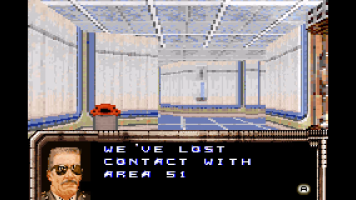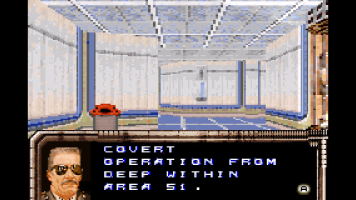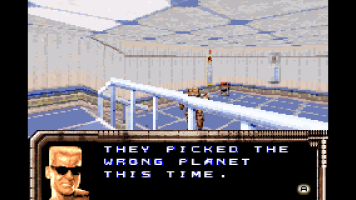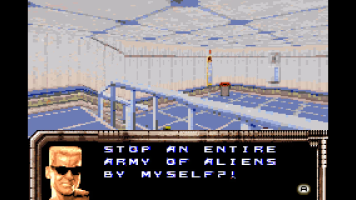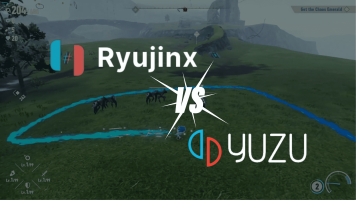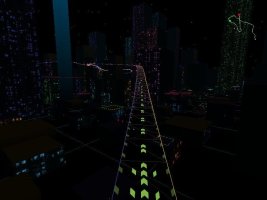To give an example, this happened to us recently when we stumbled across a fascinating tweet from @SlappyCromwell on Twitter, claiming that Duke Nukem Advance for the Game Boy Advance had two separate English localizations in North America and Europe that most people never even knew about. According to @SlappyCromwell, they only became aware of this recently, thanks to looking up videos of the Evercade compilation Duke Nukem Collection 2 and spotting some strange differences from the version they originally played as a kid. From there, they then checked out the ROMs and documented the differences on a Cutting Room Floor page they had recently put together. This shows that the North American release, on the whole, was much wordier and edgier than the European version, and that bizarrely Duke had different opinions on opera depending on which version of the game you play
As far as they're aware nobody in the Duke Nukem community had identified these differing localizations before, which they suspect is because "Duke Nukem Advance is among the more obscure titles in the franchise." They also speculate that Evercade only went with the European localization as it offers the extra language options, which makes this discovery "somewhat of a happy accident".
Inevitably, upon finding all this out, we were curious to know more about what had caused the game to have two different English localizations. Was it a case of censorship? Behind-the-scenes meddling? Or something else entirely? We were determined to find out, so we reached out to various people involved in its release, starting with its developers at Torus.
Over the span of a few days, we managed to get in touch with three of the four designers who had worked on the game at Torus: Craig Duturbure, Simon Short, and Alex Hutchison.
Duturbure was the first to reply but sadly admitted he was unable to help, as he "only dropped onto that project towards its end when much of it was complete". He was then followed by Short, who said he "[had] no idea" though he vaguely "[remembered] the US publisher having some strange misconceptions about Duke Nukem's character and what drives him that differed to the original creators."
It seemed our hopes rested with Hutchison to shine a light on the localization differences, but when he responded, he informed us that he didn't know for sure. He did, however, tell us that Apogee (3D Realms) had been "in peak micro-management mode" on the project and that "even after the game was finished spent months getting us to redraw individual images of Duke doing different things, none of which were that much better or worse than the last image". He, therefore, assumed that the differing localizations could be somehow related "to this endless spinning on the window dressing elements of the game".
From the little information these developers shared, the prevailing theory that started to develop in our heads was that 3D Realms were somehow unhappy with the original localization and had requested changes to the text. So our next step was to reach out to the executive producers on the project at 3D Realms Scott Miller and George Broussard, as well as the game's producer Steven Blackburn. Unfortunately, Blackburn never responded to our LinkedIn message, but both Miller and Broussard did their best to offer a response.
Miller was the first to reply. Much like the others, he didn't remember anything about this, but actually claimed he preferred the EU version due to its simplified text: "I didn't remember this from back then, so I read through the different versions via the link you sent. In my opinion, the EU is written by a better writer and has simplified much of the text. There are a few parts where the US version might be better in my opinion, but overall the EU version is just much more to the point and with less to read, so I prefer it. I really have no idea how the game ended up with two versions of English text! I suspect someone on the EU end of publishing this game simply wanted to make the text less wordy."
Broussard similarly had no memory of any conflicts over dialogue, and said he would have been against another translation to "remove PG-13 cursing".
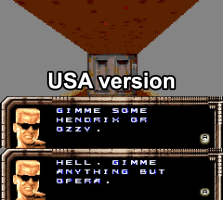
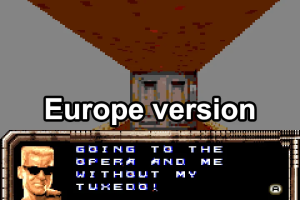
Here's one of the more bizarre changes to the text. Duke, in the European version, seems at worst indifferent to opera. In the North American version, he actively hates it.
Broussard told us, "It could well be a rogue Take 2 producer making a decision at the 11th hour and not getting permission for it. Very often publishers who were used to having full control would do things at the 11th hour and beg forgiveness versus permission because they didn't like having to run everything by us.
He continued, "It could also be that we, I, just didn't pay that close of attention to that port as it was 2002 and we'd done many ports and side projects in the 90s. Hard to know, really, without digging into records and old emails. But the above does not sound like something I would have been ok with and I had a reputation for being a hard ass on things and demanding we put in a battery backup on some GameBoy cart (maybe this one, I forget), even though it would delay and cost more and we'd all make less profit."
It seemed like if we were going to get answers, we would need to speak to someone from Take-Two, and eventually, after some digging, we were able to get in touch with someone.
This person, who we will be keeping anonymous, gave us some insight into the lay of the land at Take-Two and explained the following, "Back then, that was a common deal. You see, we had Take-Two/Rockstar in New York and Take-Two out in Windsor, in the UK, who handled our distribution and localization for all of the submissions we did in the UK, Germany, and Europe. So I would send them all of the text. The text would then go to a localization house and often we would get questions in the sidebar like, 'Certain things don't translate one-to-one equally.' So in the line you guys sent it was something like 'Hey, let's ride the slippery snake and go to Duke's amusement park.''
"I'm not saying this is exactly what happened — we're talking about something that is probably 20 years ago — but very commonly we'd get a sidebar note from the localizers saying, 'I don't know what this means in France. How does this translate one-to-one in French?' Or 'How does this translate one-to-one in insert language here?' So they likely made those changes to try and keep everything in the spirit of the original text while capturing the humour. At no point in time was it ever written to be 'canon'. That was more just for localization."
After days of searching, you can probably imagine how over the moon we were to finally get a proper answer to clear up things, even though, ultimately, there was no juicy gossip or behind-the-scenes drama to speak of (at least in this case).
Duke Nukem Advance is only a small piece of the bubble-gum-chewing, ass-kicking action hero's history in gaming, but these recent discoveries show that it still has some interesting surprises in store for those who want to dig a little deeper.



